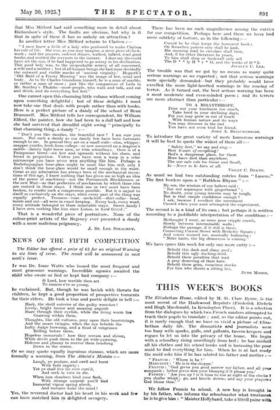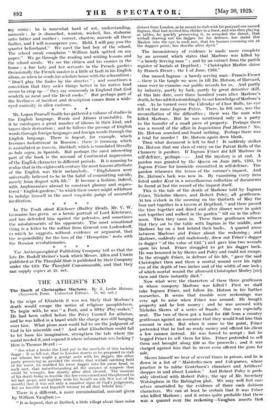THIS WEEK'S BOOKS
The Elizabethan Home, edited by M. St. Clare Byrne, is the most recent of the Haslewood Reprints (Frederick Etchels and Hugh Macdonald, in Kensington Place). It is a selection
from the dialogues by which two French masters attempted to teach their pupils to translate ; and, as the editor points out, it is rarely enough that we have so vivid a picture of Eliza-
bethan daily life. The dramatists and journalists were too busy with sparks, gulls, and gallants, tavern-keepers and
rogues to let us into the privacy of the home. We begin with a schoolboy rising unwillingly from bed ; he has mislaid all his clothes and his school books and is harassing the poor maid to find everything for him. When he is at last ready
the maid asks him if he has saluted his father and mother :— " FRANCIS : Where is he ? '
MARGARET : He is in the shoppe.'
FRANCIS : God geeve you good morow my father, and all your eompanie ; father geeve nee your blessyng if it please you.' FATHER : Are you up I is it time to rise at eight of the clocks t you shalbe whipt ; go, and kneele downe, and say your prayers s God blesse thee.' " We follow Francis to school. A new boy is brought in by his father, who informs the schoolmaster what treatment he is to give him : " Moister Hollyband, take a littell paine with
my sonne he is somewhat hard of wit, understanding, mernorie : he is shamefast, wanton, wicked, liar, stuburne unto father and mother : correct, chasten, amende all these faultes, and I will recompence you. Hold, I will pay, you the quarter beforehand." We meet the bad boy of the school. The school sneak complains " William hath spitted on my paper."- We go through the reading and writing lessons and the school meals. We see the citizen and his cronies in the house ; a fine lady and her servants in the French garden., Occasionally the French master is a little at fault in his English idiom, as when he sends his scholars home with the admonition : " Don't play the fooles by the streetes " ; and sometimes a conviction that they order things better in his native land seems to crop up—" they say commonly in England that God sendeth us meat and the Devil cooks." But perhaps part of the liveliness of incident and description comes from a wide- eyed curiosity in alien customs. * *











































 Previous page
Previous page